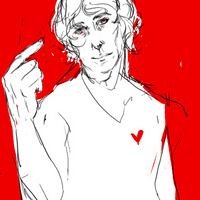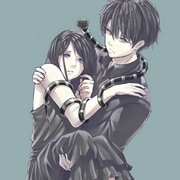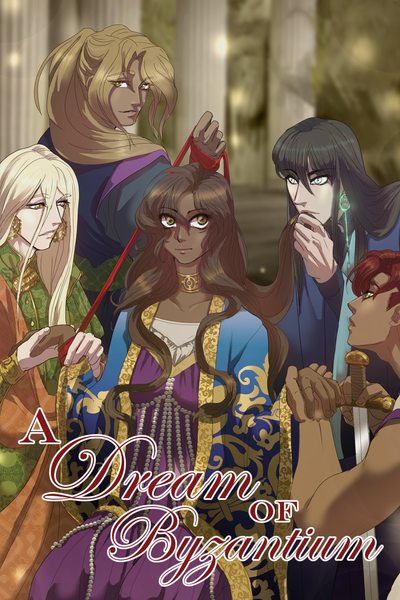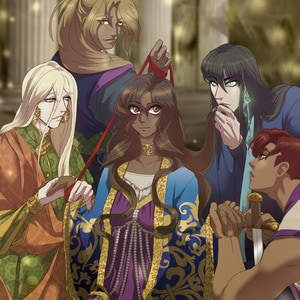It wasn’t long before the sun began to rise. As they rode, the warriors would sometimes bring their horses closer to make small talk with her. Despite their initial reluctance and their obvious distrust, she was mysterious enough to provide some entertainment for the journey.
“You must have been taught by a Phrygian scholar,” commented the leader at some point, his deep voice startling her. She was sitting in front of him, close enough that she could feel her back hitting against his chest every now and then. “Every now and then your expressions are very old-fashioned, but your accent is perfect.”
“Thank you,” Ophelia said awkwardly, feeling strange about receiving praise for something she didn’t really earn. As such is the case with dreams, it would be a waste of time to try and find fault in the finer details. She was happy enough that she could talk to them and did not care to find out the reason for her sudden polyglottism.
“Aristides is also a renowned scholar back in Phrygia,” her benefactor pointed to one of the men who rode on his right; the oldest of the bunch. “He has taught me the art of war, philosophy, and the common languages.”
Ophelia lazily looked over, eyes fixating on the tattoo on Aristides’ forearm. All of them fashioned different artwork on their bodies. Some had marks in their necks, others in their hands, or in their shoulders, even their faces; all, however, shared the same trait of having their right arm tattooed in a specific motif. She could see that in some cases a common motif was shared – some sort of animal, or perhaps a mythical creature, wrangled and transformed by the elaborate knot work of the Phrygian line art. Aristides’ was clearly a bird flying downwards, into his fingers.
“A bird for the scholars,” the man himself said when he noticed her staring. “Although we all choose our own. Mine is an ibis, for wisdom in contemplation.”
“And the others?”
“Dog,” said the smallest warrior, “for loyalty. The only warrior who has something slightly different is Ajax.”
One of the men to the left bared his arm to show some sort of canine Ophelia wasn’t imaginative enough to recognise. It was the same one who had recognised the Iceni name, and who had defended her fashion choices. “A jackal,” Ajax smiled, “For cunning.”
“The fancy one -outside of Lord Phobos’ of course- is Remulus,” Ophelia looked around, and judging by the man’s reaction, Remulus was the tall warrior who seemed to be overly cautious about her. He glowered at Ajax, clearly not appreciating being the topic of conversation. “He’s got the winged horse.”
“What’s that for?”
“Government officials. The fancy men with the wax tablets, running around writing down numbers.”
Ophelia looked to the arm on her right, almost automatically. “It’s a phoenix,” her benefactor answered the silent question.
“Seems fancy.”
“It’s the royal mark,” Aristides explained. “Only the direct descendants of the king are allowed to wear it.”
Ophelia connected the dots. “You’re the exiled prince!”
“That I am,” she couldn’t really see his expression, but if she had she would’ve felt pity at the bitter smile that arose in his face. “Prince Phobos of Phrygia at your service, princess.”
“I have an idea!” shouted Ajax, “Perhaps the princess could bring some of those famous Iceni warriors with her! I bet that would be a laugh, all of them covered in blue, no armour whatsoever! Lord Deimos would not last long.”
“He wouldn’t, and neither would we, as the Elysians need only send half of the Knights of the Black Sun to get rid of us all,” Aristides replied calmly. Remulus, in the back, snorted derisively to Ajax’s suggestion.
“This is a war best fought with politics, not swords.”
“Spoken like a true scholar,” one of the unnamed warriors quipped. “I have yet to see a pen that will parry a sword.”
Ophelia turned to look at the man. His hair and complexion was lighter than the rest. He noticed her staring, and said, “Ilmarinen at your service, princess. What do you think?”
She didn’t know how political she was allowed to get in a dream; it wasn’t that she had a very elaborate opinion on the matter, but having grown up in the times she had, she certainly couldn’t help but draw certain obvious conclusions. “I think it’s funny how war seems to always benefit a select few, and that they’re always the same ones.”
Aristides laughed. “I would be delighted to meet your teacher, princess. What an interesting thing to say.”
Remulus didn’t find her statement amusing.
“We are fighting for a just cause, princess. This is about our country, our way of life, our freedom. It concerns everyone, from the pauper to the prince.”
“Of course,” Ophelia conceded. “The problem is that not all the people moving the pieces in the board agree with you.”
It seemed like the conversation would continue for a while, but Phobos interrupted them. “We’re getting close. Ilmarinen, go forward and scout the entrance for any signs of an ambush.”
The reminder of the threat that hung over their heads silenced the party as the designated scout broke into a sprint, quickly overtaking them. The gates of Caudiceum arose from the horizon as the sun began its ascent into the sky. There was something momentous about the fiery sky, in that strange new land with those strange, archaic men. For a moment, Ophelia wondered if she hadn’t got it all wrong, and that her life had been a fever dream of the distant future. It all seemed so real. The present embraced her with a firmness she hadn’t felt in a long time; as it was when her father had been alive she was there in the moment, not feeling like she’d rather be elsewhere.
Strange thing to think while possibly riding into an ambush, that perhaps she felt comfortable in that picture.
They saw Ilmarinen riding back; he made a gesture at them that prompted a few sighs. The fact that no one raised a hand to their weapons she took as a positive sign.
“The coast is clear,” he said when the group met. “They’ve already opened the gates; whatever they have in store for us will probably be waiting after we’re inside.”
Phobos made a sign, and they all continued onwards. “We’ll dismount before reaching the gate,” he explained for her benefit. “We all ought to change; we will attract too much attention otherwise.”
Ophelia looked at her pants and her jacket, not ready to part with them. Once they stopped, the men all divested themselves of their togas, and put on kaftans with wide sleeves over their under tunics, effectively hiding most of the tattoos that covered their bodies. She too was given a kaftan, and as she took it she realized, by counting at the garments they’d taken out of the bags, that it had originally been intended for the man who had been shot down during their flight. Nothing was said, and she didn’t bring it up; she wasn’t quite sure she would be able to deal with the conversation. It was evident that her modern sensibilities and her experience of death were altogether different from theirs; she wouldn’t dare make assumptions so early in their acquaintance.
“This will have to do,” murmured Phobos, his gaze not quite the seal of approval she’d hoped. “A woman dressed as a man hopefully will not raise many eyebrows in a port.”











Comments (0)
See all